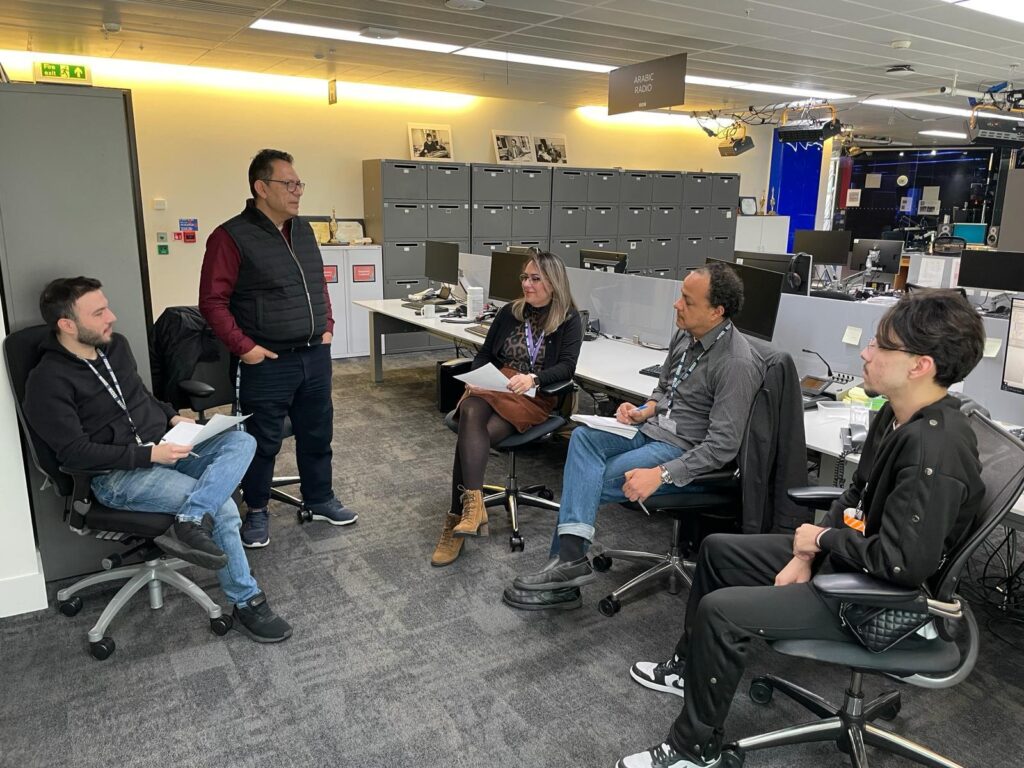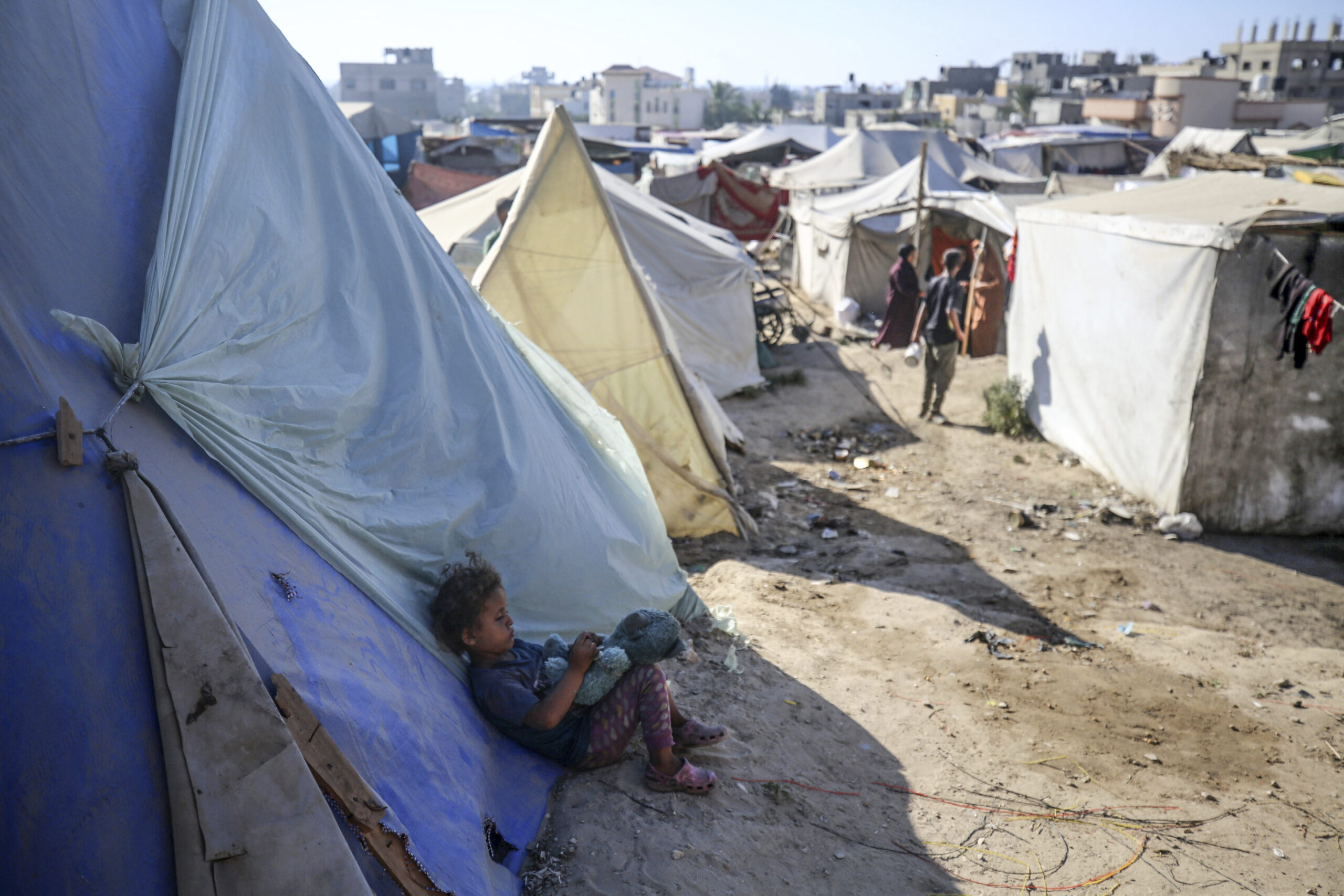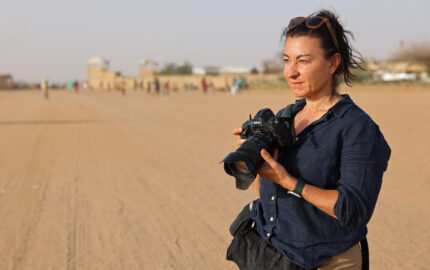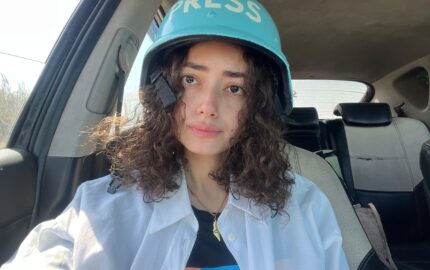On Nov. 3, 2023, the BBC World Service and BBC News Arabic launched an emergency radio service in Gaza, 27 days into the current conflict. The broadcast is a BBC Lifeline program — a radio newscast specifically for survivors of a humanitarian crisis — providing Gazans vital information on aid deliveries, air drops, medical care, safe shelter, clean water access, and more. Despite the constant threat of air strikes and internet shutdowns, the radio service has been continuing to broadcast twice a day.
The stakes could not be higher with more than 36,000 dead, 83,000 wounded, according to the Gaza Health Ministry, and nearly two million Palestinians displaced within the 41-kilometer-long strip of land. In late March, a U.N. report said famine is imminent in northern Gaza, where 70% of the population is already suffering with “catastrophic” food shortages due to difficulties in aid deliveries getting past the border. Since then, the situation has gotten worse, according to World Health Organization officials, who say that children under five are going full days without eating anything. (The U.N. has called on the Israeli government, which has restricted the flow of humanitarian aid since Oct. 7, to allow more shipments into Gaza.) According to the WHO, Gaza’s healthcare system has been “systematically dismantled.” Only a few of Gaza’s 36 hospitals are partially functioning, making healthcare practically inaccessible.
Related Posts
The BBC began airing Lifeline programs in 1994, when a new Kinyarwanda-language service began in response to the Rwandan genocide. Since then, Lifeline broadcasts were launched for the 2008 cyclone in Myanmar, the 2010 Haiti earthquakes, the 2013 Syrian refugee crisis in Lebanon, the 2014 Ebola epidemic in West Africa, and the 2017 drought in Somalia. Most recently, the BBC World Service launched Lifeline services in Sudan during the ongoing civil war and Ukraine following the war with Russia.
Ibrahaim Abdelbaki is the editor of the BBC Lifeline Service in Gaza. He is based in London and manages the Gaza Lifeline teams in London, Cairo, a correspondent in Doha, and a small group of contributors in Gaza. Previously, he was the BBC Sudan Lifeline program editor. He spoke to Nieman Reports about the Lifeline Service’s operation during the Israel-Hamas war, navigating a conflict zone without safe areas, working around internet blackouts, and gathering firsthand accounts of Gazan civilians. This conversation has been edited and condensed for clarity.
Tell us about the kinds of information you are sharing with the people of Gaza.
Each episode includes a military presence update in Gaza. We also provide updates on humanitarian efforts underway, medical service availability, shelter availability, incoming aid being delivered to Gaza, and so on, with some tips that could help people be safer.
One essential part of our program is to give people tips on how to deal with wounds, how to deal with fractures, how to help people under debris when there is no way for the paramedics to reach the area so that they might tell others. So we are trying to help on multiple levels.
We also share firsthand accounts of the people of Gaza from all parts of the strip, telling their stories. For example, they are telling us about their repeated displacement, their fears, their grief about the loss of their beloved ones, their reactions to aid drops, their accounts about their return to their destroyed old houses under the Israeli bombardment. They talk us through everything they feel and face in Gaza during the war.
What are the main challenges you’ve encountered in setting up the BBC Gaza Lifeline service?
The situation in Gaza is very dire, especially at the humanitarian level, with about 2 million people displaced and hundreds of thousands of people suffering from starvation, famine, and diseases. Most of the people in Gaza have been on the move since Oct. 7.
We are trying hard to be aligned with our policies, deadlines, our ethics and at the same time, we're trying to minimize our reaction as human beings. I can say honestly that I have been through so much coverage through the years since 2003. I’ve covered the Arab Spring and many wars, like in Iraq, and what is happening now in Gaza is absolutely unprecedented.
One of the most difficult aspects was assembling a team with the necessary experience and expertise to handle a Lifeline program. A Lifeline program is different from a current affairs program. It requires a specific format with distinctive content. But despite these challenges, we were able to assemble a new team in less than a week. This new team consists of some freelancers who previously worked in our last Lifeline [program] in Sudan, which lasted about six months.

Most of the team knew the ins and outs of the Lifeline problem. But one major challenge is the frequent interruption of phone and internet connection. Initially, this was a significant hurdle. But over time, both journalists and the local population have adapted to the situation. For example, many journalists now utilize eSIM cards, which remain unaffected by such interruptions. Some individuals [in Gaza] residing very close to a different border can have an internet signal.
How are people responding to your broadcasts?
At the local level, people in Gaza can listen to our program on medium waves as well as on FM. Through our partners, Radio Bethlehem 2000 and Voice of All Lebanon, the FM range covers Gaza, West Bank, Western Jordan, and Lebanon. Given the circumstances in Gaza, there is no way to get stats. We measure the reach and impact through direct contact with civilians in Gaza, including journalists who gave us a positive reaction and response to our output.
When it was announced that the BBC was launching a lifeline radio service to address the situation in Gaza, numerous international aid organizations, including the ICRC [International Committee of the Red Cross], OCHA, UNRWA, and others, reached out directly to explore opportunities of cooperating and collaborating. They recognize the importance in providing accurate, reliable and firsthand information to the people in Gaza, to help with their safety, which is our main objective. Since then, we have been in regular communication with [those agencies] and their workers, featuring their representatives on our program on a daily basis.
How are you assessing risk and safety when it comes to your team members who are on the ground in Gaza?
Previously, we relied on our correspondent who was stationed there to provide us with military updates. [Before he was evacuated to Doha] his presence and his posting were constantly monitored, and subjected to ongoing risk assessments by our security experts. However, we also rely on journalists who have sought refuge in various shelters, living in schools and hospitals among other displaced people [for information]. We can confirm their real-time locations, and get information from doctors, paramedics, and civil workers.
How long are you planning on running the Lifeline service in Gaza?
I want this project to continue for as long as possible because the ongoing situation in Gaza will not end soon. Even though the war will stop or end, the humanitarian situation in Gaza will be dire for a very long time.
[In January] the program was extended for another three months. The program has been extended for the third time, for three more months. It will continue till the end of July 2024, with the possibility of extension for another period beyond July. We are keen to provide our distinctive content. We are keen to keep listening to people and let their voices be heard all over the world. We are keen to help people to be safe, and for them to help others.



